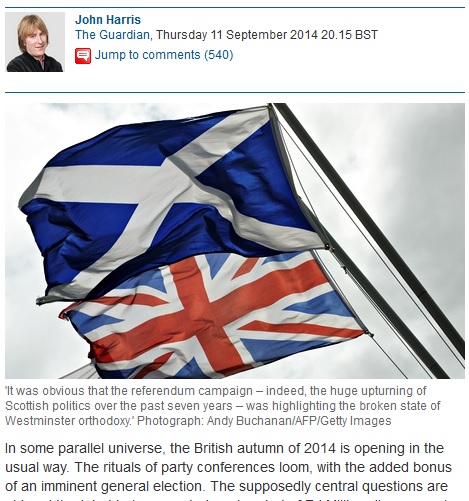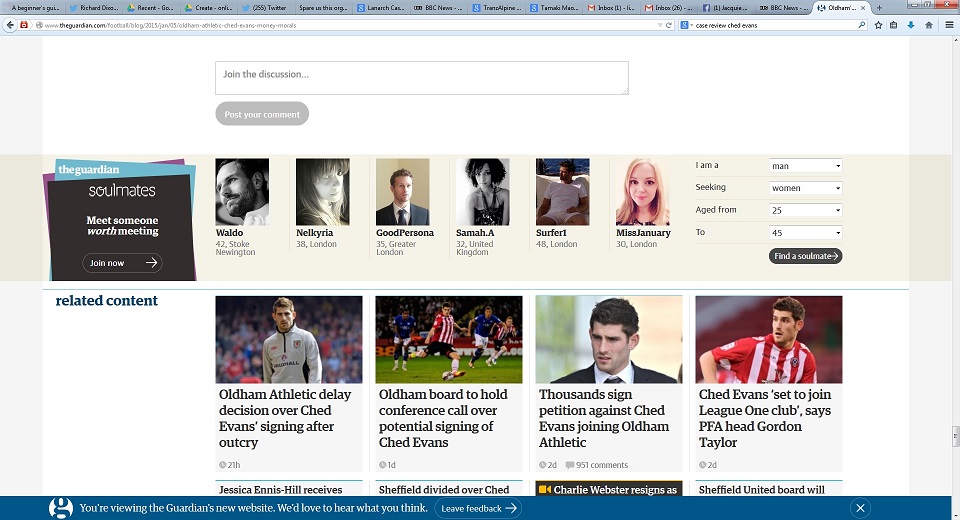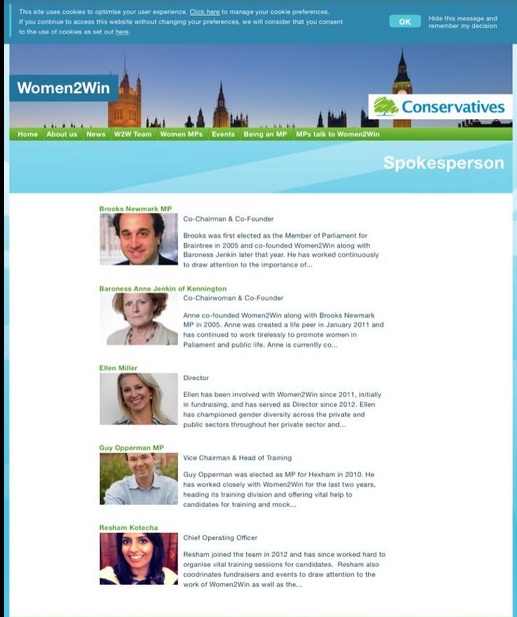|
I wonder what human-robotic combo at the Pulitzer prizewinning Guardian decided it was a good idea to sandwich a jumping-in point for its lonely hearts enterprise Soulmates between comments on a story about convicted rapist and sometime footballer Ched Evans and 'related content'.
0 Comments
I had promised myself when I was about 30 that when I got to a certain age I wouldn't mither on about how things had got worse.
Now that I have almost reached my BlankZero birthday, I am convinced that one thing has got worse, or at least not improved. I refer to the relative illiteracy and lack of thoroughness of the apparently well-educated. One way in which this manifests itself in journalism is the inability to get names, aka proper nouns, right. Now I have no prejudice as such against those with degrees (I have two, thanks). However, I have become increasingly old-fart intolerant of the youngish unteachable graduate who knows everything but is cavalier about names. One way to labour the point is to call the sinner Sebastian "Simon" or miscreant Clarissa "Carol" a few times. Fewer and fewer young hacks now undergo ordeal by grieving family. This scenario involves being sent to cover a local funeral, getting the misspelt name of the deceased into print, and then fielding an irate phone call or being at the wrong end of a face-to-face verbal mauling from the dead person's burly, overwrought brother. In my relative yoof, I once revise-subbed (a synonym for "fiddled with") a headline on a page lead at the Times and managed to render a French presidential surname, Mitterrand, minus the second R. It did not get into the hands of the readers, having been stopped in time, but the foreign chief sub rightly bollocked me (albeit in front of all my colleagues, following the finest Voltairean tradition of pour encourager les autres). Now that such open, personal reprimands would probably be deemed bullying or harassment, they either occur in private or not at all. Paradoxically, in this age of electronic transparency, many an organ now hangs its dirty linguistic laundry out to dry online, so to speak. Regular confessions of shortcomings appear under "corrections", "clarifications" and the like. A surprising number involve getting names wrong. I say "surprising", as many are mistakes that I think ought to have been prevented by proper subediting/copy editing. Sadly - a frequent theme of my mutterings these days - globally known organisations and titles have decided to cut back on in-depth subbing/copy editing and have thrown nearly everything at producing more and more content. As the computer programming saw has it, "rubbish in, rubbish out". Most naming errors start with writers, but can be finished before the reader sees them by judicious editing. There now follows a short stroll through the Proper Noun and Associated Adjective Hall of Shame. Giggle and/or wince as the mood takes you. From the Guardian: "Colombia was misspelled as Columbia in a panel accompanying an article about security lapses involving the US president ('Red faces at White House over intruder failure', 1 October, page 21)." From the Daily Mail: "A report of the Derby County v Reading match last Tuesday mistakenly referred to Derby player Will Hughes as Lee Hughes." From the Wall Street Journal: "The first name of Vicente Fox, the former president of Mexico, was misspelled as Vincente in a Thursday Personal Journal article and accompanying photo caption about diplomats staying at hotels in New York for the UN General Assembly."; and "Belinda Ellis was a consultant with White Lily flour. A Sept. 6 Off Duty article about biscuits incorrectly referred to the brand as Lily White flour." And another from the WSJ: "A Palladian window was incorrectly identified as a palladium window in a Spaces column on Tuesday." I suspect, or at least hope, there is a business case to be made that publishing such blunders does reputational damage to established news brands and reduces the credibility gap between them and the start-up upstarts. It may even mean that ageing pedants like me continue to find gainful employment, continuing to sort out copy and enlightening the younger generations about how to do the same. But if the old school continues to construct its hall of shame in the palladium style, it could prove a costly mistake. Older men and younger women: now there's a subject I know something about.
First, let me declare an interest. I am an older man, metaphorically hurtling towards a BlankZero birthday, but I think I'm relatively safe in mixed company. And, by the way, I probably won't contemplate voting Liberal Democrat while Chris Rennard continues to enjoy the party whip in the Lords. Of course, I'm nowhere near as ancient as the Methuselah Vince Cable, but I am the youthful Brooks Newmark's senior by about 0.35 of a decade. I mention these two gents of the Commons political classes as they have both fallen foul of one of the oldest tricks of espionage and journalistic practice. It even has a name: honeytrap, defined by the Oxford dictionary as "a strategem in which an attractive person entices another person into revealing information or doing something unwise". Dear old Vince, fairly newly installed in ministerial office in 2010, decided to show off to a couple of young women who came calling at one of his constituency surgeries. He strayed into heady political territory, mouthing off inappropriately - given his Cabinet responsibilities - about Rupert Murdoch, and of course the two young persons were really undercover reporters for the Telegraph, posing as supporters of Mr/Dr Cable's party, the Liberal Democrats. There followed Vincesque wailing and gnashing of teeth. Moans were made about this and that Telegraph report to the Press Complaints Commission, and editorial knuckles were duly rapped. Similar anguish about alleged press entrapment surrounds last weekend's (snigger, snigger) tale of Mr Newmark, who sent an online snap of his winky (qv), it is said framed by a fetching glimpse of his paisley pyjamas, to a "young woman" who was actually a male undercover (sic) reporter. The full tabloid exposé got an airing in the Sunday Mirror. I got into a bit of a Twitter spat on Sunday with a Zoe Williams, of the Guardian, after I took issue with her piece suggesting that Mr Newmark should not have resigned his ministerial office for his action. I say "a", because I was as unfamiliar with her and her oeuvre as I'm certain she is of me and mine. My own view is that Mr Newmark is now unfit even to be an MP on the ground that he is guilty, by his own admission, of an act of gross stupidity: "a complete fool". Of course, he also appeared to have undergone an irony bypass. He requested in a resignation statement that his privacy be respected. Even people with the disadvantage of being Harvard-educated multimillionaire government ministers ought to be capable of exercising some judgement in answer to the question: "Is it OK for me, a married man with five children and with a brief in the Conservative Party for encouraging more women into Parliament through Women2Win, to send a picture of my schledium to a complete stranger?" (My screen grab, above, of the organisation's website is from before Mr Newmark was semi-airbrushed out of its history. Then you saw him, now you don't. Although he still gets a text credit. Awww.) Those of us who are often at the end, so to speak, of the journalistic production line need to have similar concerns as editorial lawyers about the likely provenance and veracity of copy. After us, stories are in the hand of the reader, the written-about and their lawyers. Yes, some journalistic methods are underhand, but then so can be those of parliamentarians who, say, cook up expenses claims, incubate dodgy dossiers or take inappropriate advantage of their position. Journalistic sting operations tend to be targeted and, whatever the protestations of the alleged victims and their apologists, often illuminate and amuse the rest of us while embarrassing the stung. I have no sympathy for senior politicians who display unacceptable naivety and get caught out. The Newmark saga shows an imperfect, supposedly free, robust and knockabout press doing its work: keeping professional politicians with an apparently heightened sense of entitlement on their toes. We should be grateful that stingers are often playful, investigative journalists who do care about accountable democracy in Britain and are not agents of hostile governments and groups.  Beginners, start here. Yes, that's something of a tautology. One of the many tasks of the proper subeditor/copy editor is, to use the technical term, cut the crap. It may be invidious to pick out an individual. John Harris, of the Guardian, is merely another of the countless exponents of "added bonus". A bonus is "an extra and unexpected advantage", says the Oxford. Since the meanings of "added" and "extra" are synonymous, young JH could have saved himself five keystrokes by simply writing "bonus". And many more in future if he follows my advice for most of the times that he writes "bonus". Deliberate deployment of tautology is best left for the poetic, eg, the "bosky wood" of Rupert Brooke. Tautology is likely to be a recurring theme in these pages. One of my favourites is "ruling military junta", which can invariably be rendered accurately as "junta". Well done, the Wall Street Journal and no end of others. |
AuthorRichard Dixon has Archives
January 2015
Categories
All
|
- Home
- General Election 2019
-
Brexit
- Whitetops immigration
- Theresa's travels
- Gove and Trump
- Theresa May's trousers
- Brexit blog
- Events
- Daily Express
- Daily Mail
- Daily Mirror
- Daily Star
- Daily Telegraph
- i
- The Guardian
- The Sun
- The Times
- Daily Star Sunday
- Mail on Sunday
- The Observer
- The People
- Sunday Express
- Sunday Mirror
- Sunday Telegraph
- Sunday Times
- Sun on Sunday
- The schedule
- Blogs
- The industry
-
SubScribe commentary
- Paris terror attacks
- Mohammed Emwazi and Isis killings >
- Charlie Hebdo massacre >
- Kidnapped Nigerian schoolgirls >
- Ebola
- Frontline reporting
- Typhoon Haiyan
- Obama's selfie
- It takes all sorts to make a family >
- Ashya King and the force of authority >
- Poppymania
- Cameron's tax cut promise >
- Brooks Newmark sting
- Scottish referendum >
- The European elections audit >
- Maria Miller
- Harman, Hewitt and the paedophiles >
- Immigration >
- Prince Charles and the floods >
- Food banks
- Why is football more important than all the news? >
- The weather
- Odds and sods
-
OpEd
-
Oped December
>
- Politics 22-12-15
- Brexit: 21-12-15
- Politics 18-12-15
- Politics 17-12-15
- Politics 16-12-15
- EU referendum: 15-12-15
- Politics 14-12-15
- Right-wing politicians 11-12-15
- Donald Trump: 10-12-15
- Donald Trump: 09-12-15
- Politics: 08-12-15
- Politics: 07-12-15
- Syrian airstrikes 04-12-15
- Syrian airstrikes: 03-12-15
- Syrian airstrikes: 02-12-15
- Labour and Syria: 01-12-15
-
OpEd November
>
- Syrian air strikes: 30-11-15
- Autumn Statement: 27-11-15
- Autumn Statement: 26-11-15
- Russia in Syria: 25-11-15
- Comment awards 24-11-15
- Paris attacks: 23-11-15
- Politics: 20-11-15
- Paris attacks 19-11-15
- Terrorism: 18-11-15
- Paris attacks 17-11-15
- Paris attacks 16-11-15
- Politics: 13-11-15
- Politics 12-11-15
- Politics: 11-11-15
- Britain and Europe: 10-11-15
- Remembrance: 09-11-15
- Sinai jet crash: 06-11-15
- UK politics 05-11-15
- UK politics: 04-11-15
- State surveillance: 03-11-15
- Poliitics: 02-11-15
-
OpEd October
>
- Politics: 30-10-15
- Tax credits: 29-10-15
- Tax credits: 28-10-15
- Tax credits: 27-10-15
- Lords v Commons: 26-10-15
- UK politics: 23-10-15
- Politics: 22-10-15
- Xi Jinping: 21-10-15
- Xi Jinping: 20-10-15
- China visit: 19-10-15
- Politics: 16-10-15
- Politics 15-10-15
- Politics: 14-10-15
- EU referendum 13-10-15
- Europe: 12-10-15
- Politics 09-10-15
- Cameron's speech: 08-10-15
- Conservatives: 07-10-15
- Conservatives: 06-10-15
- Conservatives: 05-10-15
- Politics 02-10-15
- Labour conference 01-10-15
-
OpEd September
>
- Politics 01-09-15
- Europe 02-09-15
- Migrant crisis 03-09-15
- Migrant crisis 04-09-15
- Migrant crisis 07-09-15
- Migrant crisis 08-09-15
- OpEd: Drone strikes 09-09-15
- OpEd: Migrant crisis 10-09-15
- OpEd: Jeremy Corbyn 11-09-15
- OpEd: Jeremy Corbyn 14-09-15
- OpEd: Jeremy Corbyn 15-09-15
- OpEd: Jeremy Corbyn 16-09-15
- OpEd: Jeremy Corbyn 17-09-15
- OpEd: Labour 18-09-15
- OpEd: Politics 21-09-15
- OpEd: "Pig-gate" 22-09-15
- OpEd: Politics 23-09-15
- OpEd: VW 24-09-15
- OpEd: Volkswagen 28-09-15
- OpEd: Politics 25-09-15
- OpEd: Politics 29-09-15
- Oped: Labour conference 30-09-15
-
OpEd August
>
- OpEd: Calais 03-08-15
- OpEd: Labour 04-08-15
- OpEd: Labour 05-08-15
- OpEd: Kids Company 06-08-15
- OpEd: Kids Company 07-08-15
- OpEd: Labour 10-08-15
- OpEd: Politics 11-08-15
- OpEd: Politics 12-08-15
- OpEd: Politics 13-08-15
- OpEd: Labour 14-08-15
- OpEd: Labour 17-08-15
- OpEd: Labour 18-08-15
- OpEd: Labour 19-08-15
- OpEd: Student debt 20-08-15
- OpEd: Politics 21-08-15
- OpEd: Politics 24-08-15
- OpEd: Politics 25-08-15
- OpEd: Politics 26-08-15
- OpEd: Jeremy Corbyn 27-08-15
- OpEd: TV shootings 28-08-15
-
OpEd July
>
- OpEd: Grexit 01-07-15
- OpEd: Heathrow 02-07-15
- OpEd: Greece 03-07-15
- OpEd: Taxation 06-07-15
- OpEd: Greece 07-07-15
- OpEd: Budget 08-07-15
- OpEd: Budget 09-07-15
- OpEd: Budget 10-07-15
- OpEd: Greece 13-07-15
- OpEd: Greece 14-07-15
- OpEd: Iran 15-07-15
- OpEd: UK politics 16-07-15
- OpEd: UK politics 17-07-15
- OpEd: Boris Johnson and Greece 20-07-15
- OpEd: counter-terrorism 21-07-15
- OpEd: Labour 22-07-15
- OpEd: Labour 23-07-15
- OpEd: Labour 24-07-15
- OpEd: Labour 27-07-15
- OpEd: Lord Sewel 28-07-15
- OpEd: Labour 29-07-15
- OpEd: Calais 30-07-15
- OpEd: Calais 31-07-15
-
OpEd June
>
- OpEd: Fifa 01-06-15
- OpEd: British politics 02-06-15
- OpEd: Charles Kennedy 03-06-15
- OpEd: Politics 04-06-15
- OpEd: Fifa 05-06-15
- OpEd: Politics 08-06-15
- OpEd: Europe 09-06-15
- OpEd: politics 10-06-15
- OpEd: Politics 11-06-15
- OpEd: Politics 12-06-15
- OpEd: Politics 15-06-15
- OpEd: Social mobility 16-06-15
- OpEd: UK politics 17-06-15
- OpEd: UK politics 18-06-15
- OpEd: Greece 19-06-15
- OpEd: Greece 22-06-15
- OpEd: Greece 23-06-15
- OpEd: UK politics 24-06-15
- OpEd: UK politics 25-06-15
- OpEd: Brexit 26-06-15
- OpEd: Tunisia 29-06-15
- OpEd: Grexit 30-06-15
-
OpEd May
>
- OpEd: Election 01-05-15
- OpEd: Election 05-05-15
- OpEd: Election 06-05-15
- OpEd: Election 07-05-15
- OpEd: Election 08-05-15
- OpEd: Scotland 11-05-15
- OpEd: UK politics 12-05-15
- OpEd: The Labour party 13-05-15
- OpEd: The Labour party 14-05-15
- OpEd: Ukip and Labour 15-05-15
- OpEd: UK politics 18-05-15
- OpEd: The NHS 19-05-15
- OpEd: The Labour party 20-05-15
- OpEd: UK politics 21-05-15
- Oped: UK politics 22-05-15
- OpEd: UK politics 26-05-15
- OpEd: Europe 27-05-15
- OpEd: The Queen's Speech 28-05-15
- OpEd: Fifa 29-05-15
-
OpEd April
>
- OpEd: Election 01-04-15
- OpEd: Election 02-04-15
- OpEd: Election 07-04-15
- OpEd: Election 08-04-15
- OpEd: Election 09-04-15
- OpEd: Election 10-04-15
- OpEd: Election 13-04-15
- OpEd: Election 14-04-15
- OpEd: Election 15-04-15
- OpEd: Election 16-04-15
- OpEd: Election 17-04-15
- OpEd: SNP 20-04-15
- OpEd: Refugees 21-04-15
- OpEd: Election 22-04-15
- OpEd: Election 23-04-15
- OpEd: Election 24-04-15
- OpEd: Election 27-04-15
- OpEd: Election 28-04-15
- OpEd: Election 29-04-15
- OpEd: Election 30-04-15
-
OpEd March
>
- OpEd: Election 31-03-15
- OpEd: Depression 30-03-15
- OpEd: Prince Charles 27-03-15
- OpEd: UK politics 26-03-15
- OpEd: David Cameron 25-03-15
- OpEd: Singapore 24-03-15
- OpEd: UK politics 23-03-15
- OpEd: UK politics 20-03-15
- OpEd: the Budget 19-03-15
- OpEd: UK politics 18-03-15
- OpEd: race in Britain 17-03-15
- OpEd: UK politics 16-03-15
- OpEd: UK politics 13-03-15
- OpEd Jeremy Clarkson 12-03-15
- OpEd: UK politics 11-03-15
- OpEd: UK politics 10-03-15
- OpEd: UK politics 09-03-15
- OpEd: Scotland 06-03-15
- OpEd: Isis 05-03-15
- OpEd: UK politics 04-03-15
- OpEd: Radicalisation 03-03-15
- OpEd: Russia 02-03-15
-
OpEd February
>
- OpEd: UK politics 27-02-15
- OpEd: minority party leaders 26-02-15
- OpEd: the Greens 25-02-15
- OpEd: Rifkind and Straw 24-02-15
- OpEd: world affairs 23-02-15
- OpEd: UK politics 20-02-15
- OpEd: Chelsea and racism 19-02-15
- OpEd: UK politics 18-02-15
- OpEd: UK politics 17-02-15
- OpEd: Copenhagen 16-02-15
- OpEd: UK politics 13-02-15
- OpEd: UK politics 12-02-15
- OpEd: politics 11-02-15
- OpEd: politics 10-02-15
- OpEd: UK politics 09-02-15
- OpEd: UK politics 06-02-15
- OpEd: Isis atrocity 05-02-15
- OpEd: UK politics 04-02-15
- OpEd: UK politics 03-02-15
- OpEd: UK politics 02-02-15
-
OpEd January
>
- OpEd: rape law 30-01-15
- OpEd: UK politics, 29-01-15
- OpEd: Greece 27-01-15
- OpEd: UK politics 28-01-15
- OpEd: UK politics 26-01-15
- OpEd: UK politics 23-01-15
- OpEd: Chilcot inquiry 22-01-15
- OpEd: Page Three 21-01-15
- OpEd: anti-semitism 20-01-15
- OpEd: religion and freedom 19-01-15
- OpEd: world politics 16-01-15
- OpEd: election debates 15-01-15
- OpEd: Charlie Hebdo 14-01-15
- OpEd: Charlie Hebdo 13-01-15
- OpEd: Charlie Hebdo 12-01-15
- OpEd: Charlie Hebdo 08-01-15
- OpEd: Charlie Hebdo 09-01-15
- OpEd: UK politics 07-01-15
- OpEd: UK politics 05-01-15
- OpEd: UK politics 06-01-15
-
Oped December
>
- You have to laugh
-
Backnumbers
- About SubScribe
- Join the SubScribers
- Contact us
- Subscribe to SubScribe



 RSS Feed
RSS Feed


